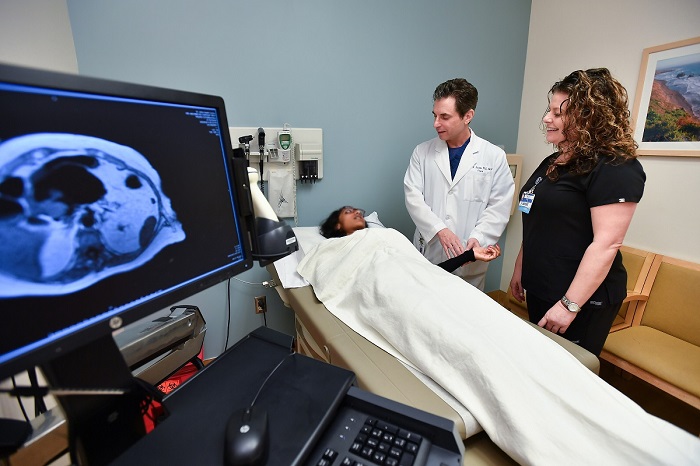
Written by Anton Bilchik, M.D., Professor of Surgery, Chief of General Surgery, and Director of Gastrointestinal and Hepatobiliary Tumors Program at the Saint John’s Cancer Institute.
Colon cancer awareness is more relevant now than ever before. Recent studies show a five-fold increase in people under age 50 diagnosed with colon cancer, particularly millennials. In honor of National Colorectal Cancer Awareness Month, you’ll find useful information about risk factors, symptoms, types of colon cancer, ways to prevent it, and treatment options for managing the disease below.
Colon Cancer is Affecting People Earlier
Colon cancer no longer just affects people over 50. It’s striking men and women at younger ages—even those in their 20’s, 30’s, and 40’s. Since people assume that they can’t get colon cancer until they’re older, the disease is going undetected until it’s in advanced stages. With that said, the American Cancer Society has reduced the screening age for colon cancer from age 50 to 45. So, it’s important to be aware of the risk factors and symptoms of colon cancer.
The good news is that about half of colon cancer cases can be prevented through diet and lifestyle changes, and it is the most treatable form of cancer. The five-year survival rate for colon cancer found early is 90 percent, but only 14 percent if found at later stages.
What is Colon Cancer?
Colorectal cancer is cancer that begins in the colon or rectum. In the United States, it is the third most common cancer affecting men and women and the second leading cause of cancer death in both groups combined.
Usually, colon cancer develops slowly over many years and often begins as a non-cancerous polyp, or lesion, on the inner lining of the colon or rectum. Depending on the type of lesion, polyps can become cancer if they’re not removed, but not always.
What are the Symptoms?
Unfortunately, colon cancer often has no symptoms, making screening tests, such as colonoscopies, very important. However, if symptoms do occur, they can include:
- Blood in the stool or bleeding from the rectum
- A change in bowel habits, including diarrhea, constipation, or narrowing of the stool that lasts longer than a few days.
- Abdominal pain
- A constant feeling that you need to have a bowel movement, but it doesn’t go away after passing stool.
- Weakness
Note that other conditions cause some of these symptoms, but you should see your doctor if they continue. Make an appointment with your doctor ASAP if you experience any rectal bleeding or blood in the stool.
Is Colon Cancer Preventable?
Colorectal cancer can be prevented. Screenings, such as colonoscopies, can find cancerous polyps in the colon. At-home tests can also detect blood in the stool.
Diet and Exercise May Help Prevent Colorectal Cancer
A 2017 report by the American Institute for Cancer Research (AICR) and the World Cancer Research Fund (WCRF) found that eating processed meats daily, including hot dogs and bacon, increases the risk of colorectal cancer. The more a person eats, the higher their risk. The study also found that exercise and a diet rich in whole grains reduces the risk of colon cancer.
What are the Types of Colon Cancer?
Over 95 percent of colon cancers are adenocarcinomas—cancers of the cells that line the interior of the colon and rectum. Less common types of tumors include gastrointestinal tumors, lymphomas, and carcinoid tumors. You can learn more about the types of colorectal cancers.
What are the Risk Factors for Colon Cancer?
There are several risk factors for colorectal cancer, and they include:
- Age: Most colon cancers occur in people in their 60’s and 70’s. However, colorectal cancer in younger people is becoming more common.
- Polyps: Polyps in the colon increases risk, especially if there are many of them or if they are large
- Personal history of colorectal cancer: If you’ve had colorectal cancer previously, you have a greater risk for getting it again.
- Personal history of bowel disease: Inflammatory bowel diseases, such as ulcerative colitis or Crohn’s colitis, increase your risk of because they inflame the colon.
- History of uterine, ovarian, or breast cancer: Women who have had any of these diseases are at greater risk for colon cancer.
- Race or ethnic background: Jews of Eastern European descent and African Americans have a higher risk.
- Family history of colorectal cancer: A person with a family history of colorectal cancer, especially in a sibling or parent before age 55 or multiple relatives no matter the age, is at a higher risk.
- Genetics: Approximately 20 percent of colon cancer cases occur because of genetic mutations, and testing can be helpful. If you’re concerned about inherited syndromes that cause colon cancer, we offer advanced genetic testing.
Treatment Options for Colon Cancer
It is our goal to provide the best and most comprehensive care to our patients. We work together to identify subtle characteristics of an individual’s cancer to accurately diagnosis it. Then we focus on personalized treatment for that patient. We also strive to do all we can to preserve your quality of life during treatment.
There are several therapies for colorectal cancer depending on the type and stage. It may be treated with surgery, chemotherapy, targeted therapy with drugs, radiation, or a combination of treatments.
At the Saint John’s Cancer Institute, we are constantly testing new diagnostic methods and therapies for colon cancer. We also participate in the latest clinical trials, meaning eligible patients have access to new, experimental treatments and diagnostic approaches that are not found at other hospitals. You can learn more about the available treatment options for colon cancer by visiting our colorectal cancer treatment page.
Schedule an appointment today with one of our specialists to learn more!
SCHEDULE AN APPOINTMENT

